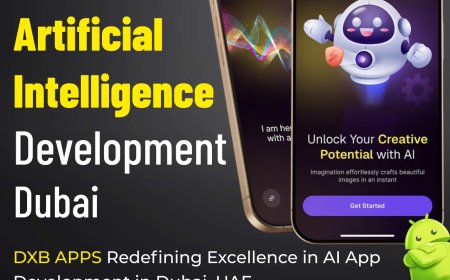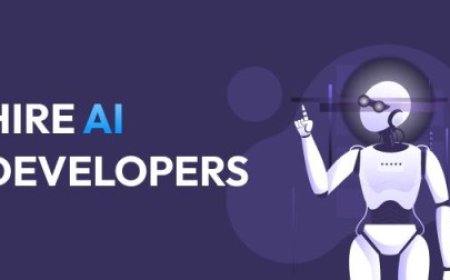Hiring AI Engineers: Roles, Responsibilities, and Cost Breakdown
This guide explores everything companies need to know about hiring AI engineers, from roles and responsibilities to the cost structure involved.

In the era of intelligent automation and digital transformation, hiring AI engineers is no longer optionalit's a competitive necessity. Businesses are leveraging Artificial Intelligence (AI) to optimize operations, enhance customer experiences, and drive innovation. But to harness this power, you need the right talent. This guide explores everything companies need to know about hiring AI engineers, from roles and responsibilities to the cost structure involved.
What Does an AI Engineer Do?
An AI engineer designs, builds, and deploys intelligent systems that can mimic human behavior or make autonomous decisions. Their work combines data science, machine learning, deep learning, and software development to create systems that learn, adapt, and evolve.
Core Functions of an AI Engineer:
-
Develop Machine Learning Models: Create and train models to recognize patterns and make decisions.
-
Data Handling: Collect, clean, and preprocess large datasets from various sources.
-
Model Deployment: Integrate models into existing software systems or cloud infrastructures.
-
AI Algorithm Optimization: Continuously refine algorithms to enhance performance.
-
Collaborate Across Teams: Work with data scientists, software developers, and stakeholders to align AI outcomes with business goals.
Key Roles of AI Engineers in Business Applications
AI engineers perform roles that vary depending on the business model and domain. Below are the most common and essential roles:
1. Machine Learning Engineer
Focuses on designing predictive models, training algorithms, and deploying scalable machine learning systems.
2. Data Scientist
Works on data analysis and modeling to uncover actionable insights using AI tools and methodologies.
3. NLP Engineer
Specializes in Natural Language Processing for applications like chatbots, voice assistants, and text analytics.
4. Computer Vision Engineer
Builds systems for image and video analysis, facial recognition, object detection, and automated inspection.
5. Deep Learning Specialist
Designs neural networks for complex tasks like language translation, autonomous driving, or fraud detection.
6. Robotics AI Developer
Develops autonomous agents and robotic systems powered by intelligent decision-making models.
Responsibilities of an AI Engineer
An AI engineers responsibilities are vast and dynamic. Below is a comprehensive list of their primary responsibilities:
-
Data Acquisition and Preprocessing: Extract meaningful features from raw data.
-
Model Selection and Validation: Choose the most suitable model architecture and validate with performance metrics.
-
Algorithm Design: Craft intelligent algorithms that solve real-world business problems.
-
System Integration: Embed AI components into web applications, APIs, or IoT devices.
-
Performance Monitoring: Track the behavior of models in production and apply improvements.
-
Documentation and Reporting: Maintain transparency and traceability of AI systems for audits and team collaboration.
Skills Required to Hire the Right AI Engineer
To build a competent AI team, look for candidates who bring both technical proficiency and business understanding.
Technical Skills:
-
Programming Languages: Python, Java, R, C++
-
Libraries and Frameworks: TensorFlow, PyTorch, Keras, Scikit-learn
-
Big Data Tools: Hadoop, Apache Spark
-
Cloud Platforms: AWS, Google Cloud, Azure
-
DevOps & CI/CD Pipelines: For model deployment and version control
Soft Skills:
-
Problem-solving mindset
-
Communication and teamwork
-
Creative and analytical thinking
-
Continuous learning attitude
How to Source and Hire AI Engineers
Hiring AI engineers can be approached through multiple channels depending on your budget, urgency, and the complexity of the project.
1. Freelance Platforms
Best for short-term projects or startups. Platforms like Toptal, Upwork, and Freelancer offer verified talent.
2. Outsourcing Companies
If you want to avoid the hassle of team management, consider AI development agencies. They provide ready teams at scalable costs.
3. In-House Recruitment
Ideal for businesses aiming to build long-term AI capabilities. Use LinkedIn, Glassdoor, and GitHub to identify top talent.
4. Remote Teams
A cost-effective model, especially if local hiring is expensive. Remote AI engineers work on a contract or full-time basis.
Cost Breakdown of Hiring AI Engineers
Understanding the cost of hiring AI engineers helps with better budgeting and ROI estimation.
| Region | Hourly Rate (USD) | Annual Salary Range (USD) |
|---|---|---|
| United States | $60 $150 | $120,000 $200,000 |
| Western Europe | $50 $120 | $90,000 $160,000 |
| Eastern Europe | $30 $80 | $60,000 $120,000 |
| India | $20 $60 | $25,000 $70,000 |
| Southeast Asia | $15 $50 | $20,000 $60,000 |
Note: Rates vary based on experience, project scope, and employment type (freelancer vs full-time).
Freelancer vs Full-Time vs Outsourcing: Cost Comparison
Freelancers:
-
Pros: Flexible, fast onboarding, cost-effective for small tasks.
-
Cons: Limited availability, less accountability.
Full-Time Employees:
-
Pros: High control, consistent delivery, cultural alignment.
-
Cons: Expensive, longer hiring cycles, overhead costs.
Outsourcing Agencies:
-
Pros: End-to-end solutions, no hiring hassle, scalable teams.
-
Cons: Less control, potential communication delays.
Best Practices When Hiring AI Engineers
-
Define Clear Objectives: Set expectations, deliverables, and timelines upfront.
-
Test Technical Skills: Conduct coding assessments or provide sample problems.
-
Evaluate Portfolios: Examine previous projects, GitHub contributions, or Kaggle rankings.
-
Cultural Fit: Ensure they align with your companys mission and work style.
-
Use Contracts: Especially for freelancers and agenciesoutline scope, timelines, and payment terms.
Why Hiring AI Engineers is a Strategic Move
Hiring the right AI engineer can unlock significant business benefits:
-
Operational Efficiency: Automate manual tasks, reduce errors, and save time.
-
Customer Experience: Personalize user interactions and support.
-
Data-Driven Decisions: Make informed decisions based on predictive analytics.
-
Revenue Growth: Discover new business models, markets, and product opportunities.
-
Competitive Advantage: Stay ahead in your industry with cutting-edge technology.
Conclusion
As AI technology continues to evolve, hiring skilled AI engineers is essential for companies looking to innovate and scale. Whether youre building smart applications, analyzing massive datasets, or automating workflows, the right AI talent can transform your business outcomes.
Understanding roles, responsibilities, skillsets, and costs helps organizations make informed hiring decisions. Choose the engagement model that aligns with your goalsbe it freelancers, full-time employees, or outsourcing partnersand build your AI strategy with confidence.


























